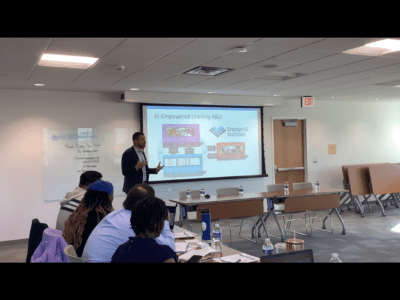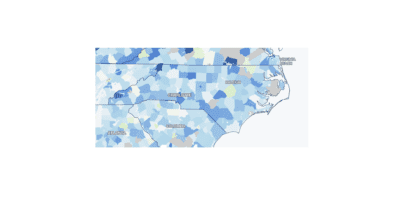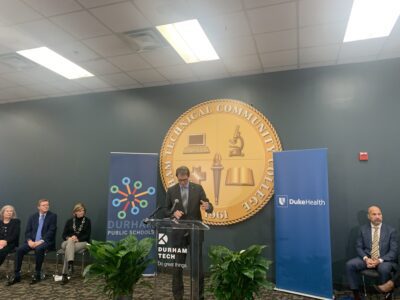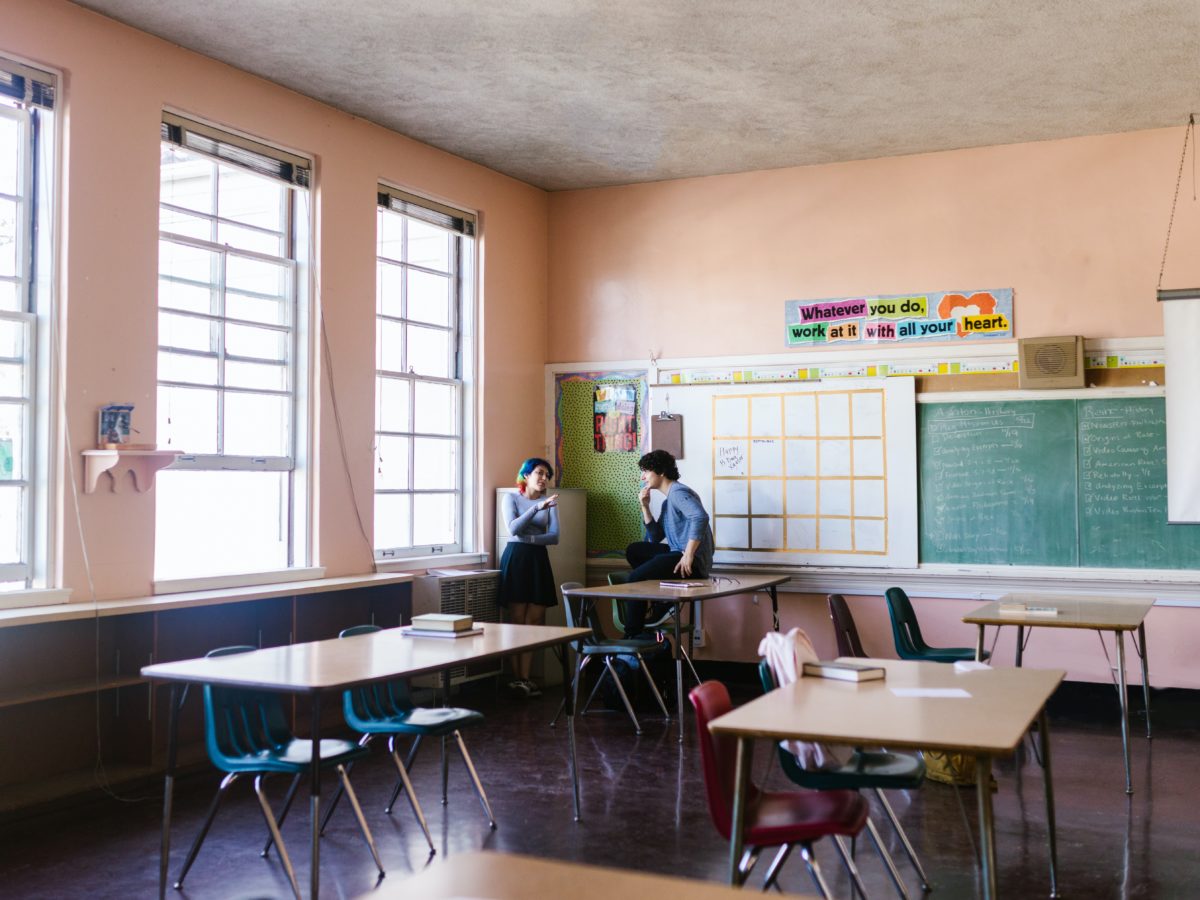
Share this story
- "The evidence which you can read in the Consolidated Data Report...clearly highlights the troubles and trauma that are pervasive in our schools and throughout our communities, touching all of us across North Carolina," Board Chair Eric Davis said.
- At the Board of Education's February meeting, the Board discussed new data on crime and suspensions, legislative priorities for the short session, and dual enrollment and credentials.
|
|
North Carolina public schools reported a decrease in dropouts during the 2022-23 school year and an increase in the number of both suspensions and “acts of crime and violence,” according to a report presented to the State Board of Education on Wednesday.
Dropouts reported among N.C. public schools for Grades 1-12 fell nearly 12% last year, the consolidated report showed. Concerning high school dropouts (grades 9-13), 2022-23 saw a more than 13% decrease.
“It is promising to see a decrease in dropouts across North Carolina’s public schools as we know time in the classroom better prepares students for their future,” State Superintendent Catherine Truitt said in a Department of Public Instruction (DPI) press release. “I’m hopeful to see this trend continue as education is essential for students’ personal and professional success.”
However, the report also included 13,193 reported acts of crime and violence in 2022-23 — an increase from 11,170 in 2021-22 and 9,554 in 2018-19. That’s an 18% increase from 2021-22, and a 38% increase from before the pandemic.
DPI cautioned against using data from the start of the pandemic, as crime rates fell sharply while schools were closed. Staff also said that some of the uptick could be due to expanded anonymous tip systems and the monitoring of student behavior across the state.
Last school year also saw a 13.5% increase in reported short-term suspensions (from 217,928 in 2021-22 to 247,454). Long-term suspensions remained relatively flat, increasing slightly to 708 suspensions from 693 in 2021-22. Additionally, 64 students were expelled in 2022-23, up from 48 in 2021-22.
At the start of Wednesday’s meeting, Board Chair Eric Davis took a moment to celebrate public schools while also acknowledging some of the concerning trends shown in the report.
“Public schools certainly are places for learning, and they’re also places for healing,” Davis said. “It’s important to remember that these challenges do not impact our public school students exclusively. The evidence which you can read in the Consolidated Data Report to the General Assembly clearly highlights the troubles and trauma that are pervasive in our schools and throughout our communities, touching all of us across North Carolina.”
The largest increase included in the crime data by far was for “possession of a controlled substance in violation of the law (for a minor.)” Reported drug possessions rose 35.7% last year — from 5,250 offenses in 2021-22 to 7,125 in 2022-23. They rose 54.8% from before the pandemic — up from 4,604 offenses.
Possession of a weapon other than a gun also saw an increase — up 54.5% from before the pandemic, but down nearly 4% from 2021-22. You can view the full list of reportable acts of crime in the chart below. Note that several categories show decreases.
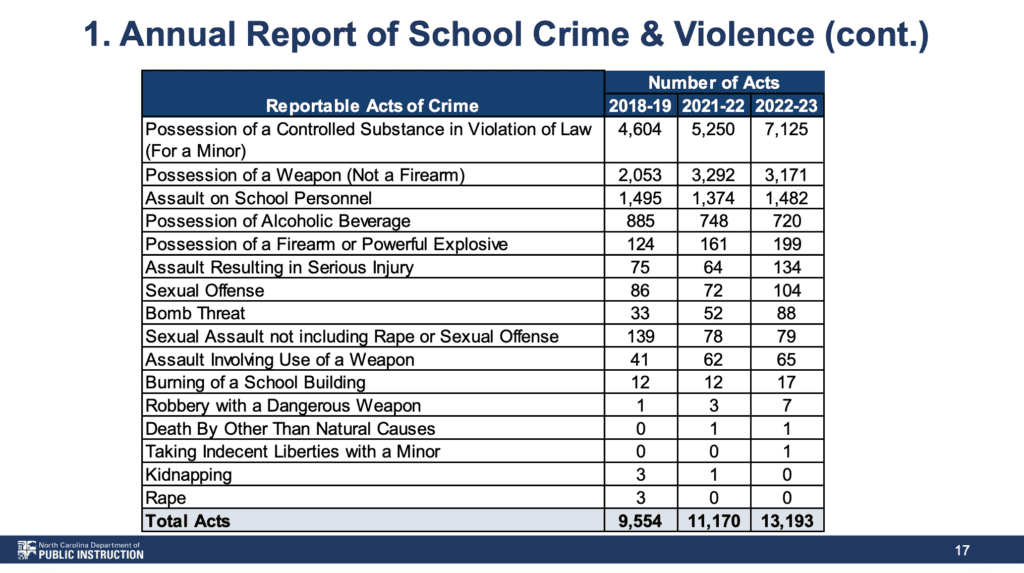
Karen Fairley, the executive director of DPI’s Center for Safer Schools, shared several recommendations from the center to address the data:
- Recognize cultural differences in students served to “offer additional support and protective factors to children of color.”
- Provide support for parents/guardians to increase protective factors.
- Employ a non-floating social worker at each school (elementary, middle and high) who focuses on prevention, intervention, and referral.
- Employ qualified professionals to offer cultural sensitivity and cultural awareness training to school staff and employees.
- Offer trauma-informed care training to school staff and employees. Implement a statewide discipline matrix model.
- Include school resource officers in positive interaction, not just classroom behavior management and situations of arrest or other punitive measures.
On Wednesday, Health and Human Services Secretary Kody Kinsley spoke about about the importance of behavioral health. Kinsley noted that the Department of Health and Human Services (DHHS) is funding mobile crisis units for schools and mental health first aid training to recognize when kids are in crisis, due to federal funds from Medicaid expansion.
Truitt acknowledged the rise of mental health issues among youth, and said schools should serve as “partners” in student mental health care, rather than bearing primary responsibility.
“This report shows that there’s something happening coming out of the pandemic that has caused these incredible increases, that prior to the pandemic were on the downward slope,” she said. “It’s going to take more than just school support personnel to work with families to rectify and begin for our students to heal.”
You can view DPI’s full presentation on the report here, and the report to the General Assembly here.
You can view crime, dropout, and suspension/expulsion data by district and individual schools on DPI’s website. That data shows varying levels of increases in crime, with some decreases across the state.
On Wednesday, the Board also received presentations with a look at 2022 data from Swain County Schools and Maureen Joy Charter School.
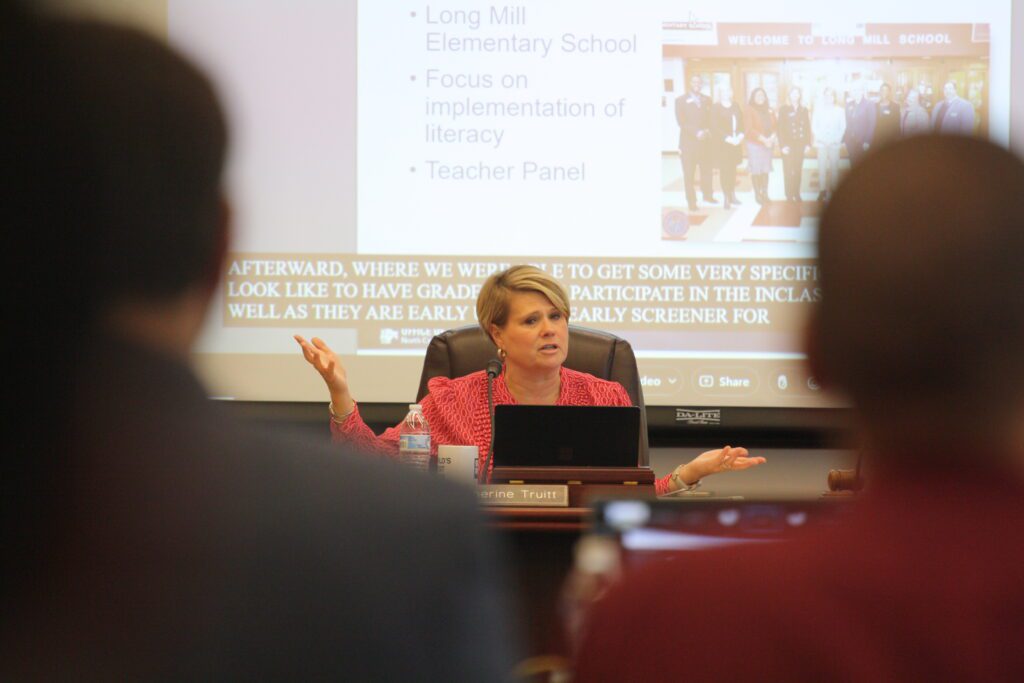
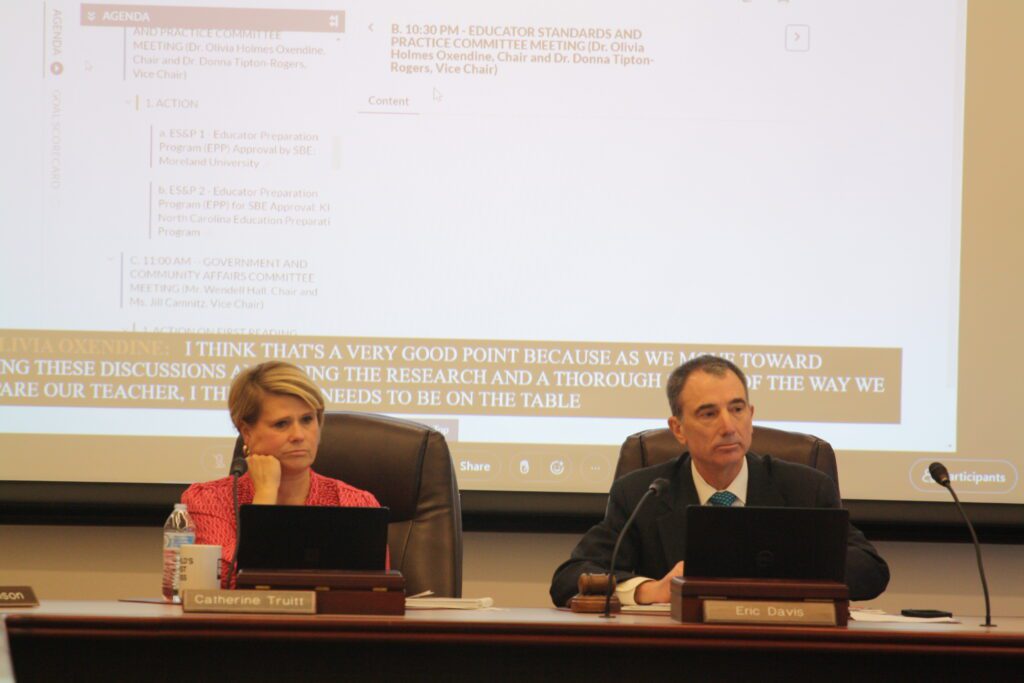
Board legislative priorities, budget implementation
On Thursday, the Board approved its legislative priorities for the short session, which begins in April.
“The North Carolina State Board of Education continues to support efforts toward school performance grade redesign and increasing teacher pay and opportunity, and it will continue to hold these initiatives as high priorities,” the document says. “In furtherance of its vision and mission, the State Board focuses its advocacy over the next few months on funding requests appropriate for the short session and acutely designed to directly impact students and schools.”
Here are the approved priorities:
- $4.5 million to continue funding efforts to transform schools designated as low performing.
- A joint ask with NC DHHS around evidence-based prevention and early intervention that addresses topics Secretary Kinsley and his team presented to the State Board on Jan. 31, to be finalized by Board leadership with NC DHHS.
- Support DPI’s efforts for a statewide policy framework for math that includes an early math screener and professional development for elementary math teachers.
- Support for DPI’s efforts to expand Read to Achieve professional development to middle grades teachers.
- The expansion of early literacy screener contract from K-3 to include fourth and fifth grades.
During the superintendent’s report, Truitt shared the same priorities, along with an explicit focus on school performance grade redesign.
The Board also discussed several policies related to the state budget that passed in September.
Charter renewal
Following legislative changes included in the budget, the Board has been working to update its policy on charter renewals. On Jan. 22, representatives from both the State Board and the Charter Schools Review Board (CSRB) met to work toward a solution.
John Blackburn, Board member and chair of the education innovation and charter schools committee, said on Wednesday that the committee hopes to bring back a revised amendment soon.
You can read the most updated draft amendment language here.
Ashley Baquero, the executive director of DPI’s Office of Charter Schools, also gave the Board a brief update on the review board.
In 2023, the CSRB received 15 total applications, Baquero said, “which is a fairly low number.”
Of that, three schools withdrew, meaning the review board only interviewed 12 schools. The CSRB denied four of those applications — approving eight, or about 53% of total applicants.
The 2024 application opened last Friday, Baquero said, and will close at the end of April.
Parent concern hearings
The Board approved an initial policy for parent concern hearings in November. Those hearings are a part of the changes passed in Session Law 2023-106, known as the “Parents’ Bill of Rights,” and expanded in the budget.
Among other things, the law allows parents to review all curriculum and establishes remedies and timelines for parental concerns. Under that provision, the law mandates that school governing bodies adopt procedures for parents to notify principals regarding concerns about curriculum. A process to resolve concerns should take place within seven days of the date of notification by the parent.
After 30 days, “the public school unit shall provide a statement of the reasons for not resolving the concern.” At that point, parents can also request a “parental concerning hearing” with the State Board of Education.
The November policy established the circumstances parents can request such hearings under, the timeline, and basic process involved.
The revised policy that was approved on Thursday includes a new section with various definitions used throughout the policy, and more clarity on some of the included processes.
You can view the revised policy here.
Three-year graduation path
The Board also discussed the three-year graduation track — consisting of 22 credits — that they were mandated to approve in the state budget.
In November, the Board adopted an emergency rule regarding a three year-graduation track. Under the new policy, the Board no longer grants “clear and specific authority to local boards of education” to exceed the 22 credits required.
Per the policy, local boards “may provide recommendations for additional requirements.”
DPI and the Board still hope a technical corrections bill will be in place before the law goes into effect, in order to allow local school boards to require more than 22 credits for students who do not opt to graduate early. Sen. Michael Lee, R-New Hanover, previously said he was working with DPI to address their concerns during the short session, which begins April 24.
On Thursday, the Board approved another policy, Accelerated Pathway for Early Graduation in Three Years, which outlines the guidance schools should give all ninth graders concerning the three-year path.
The amendment also includes a recommended course sequence for both traditional and block high school schedules, though DPI said schools can adapt the sequences based on their local needs.
The updated policy also clarifies that students who opt to graduate early are not eligible to apply or attend a Cooperative Innovative High School (CIHS) program.
“Students attending a CIHS will not have the option to be on an accelerated path for graduation in three years, as the goal of those schools is to obtain a college certificate/credential/degree in addition to a high school diploma in four or five years,” the policy says.
Sneha Shah-Coltrane, DPI’s director of advanced learning and gifted education, said many educators are curious to see the impact of this new policy. As EdNC previously reported, many schools have already allowed early graduation pathways for some students. However, most schools typically require 28 credits for graduation.
“(People) hope that students who can benefit from this do so, but that it doesn’t have unintended consequences,” Shah-Coltrane said.
Middle school computer science courses
Finally, the Board also approved, in its consent agenda, a draft list of elective introductory computer science middle school courses.
Under Session Law 2023-132, the State Board of Education must “include instruction in computer science in the standard course of study for middle and high school students.”
The new law also instructs the Board to require “a passing grade in a computer science course” for graduation, starting with ninth graders in the 2026-27 school year. In November, the Board approved a list of 82 courses for high schools. You can view the draft list here.
“I commend the General Assembly for taking this tremendous step forward in terms of modernizing education in North Carolina so that we can equip students with the skills required of 21st century graduates,” Truitt previously said in a DPI release.
Reports on CCP, credential attainment
The Board also discussed several reports regarding student attainment.
First, the Board discussed its annual report to the General Assembly on the Career and College Promise and Cooperative Innovative High School Programs. You can view that report here.
Among other things, research indicates that Career and College Promise (CCP) programs allow participants to earn postsecondary credentials at higher rates than their peers — with larger benefits for economically disadvantaged students.
CCP is “one of our most successful programs in North Carolina,” Shah-Coltrane said.
The program includes three pathways: Career & Technical Education (CTE), college transfer, and Cooperative Innovative High Schools (CIHS).
Here are some highlights from the report:
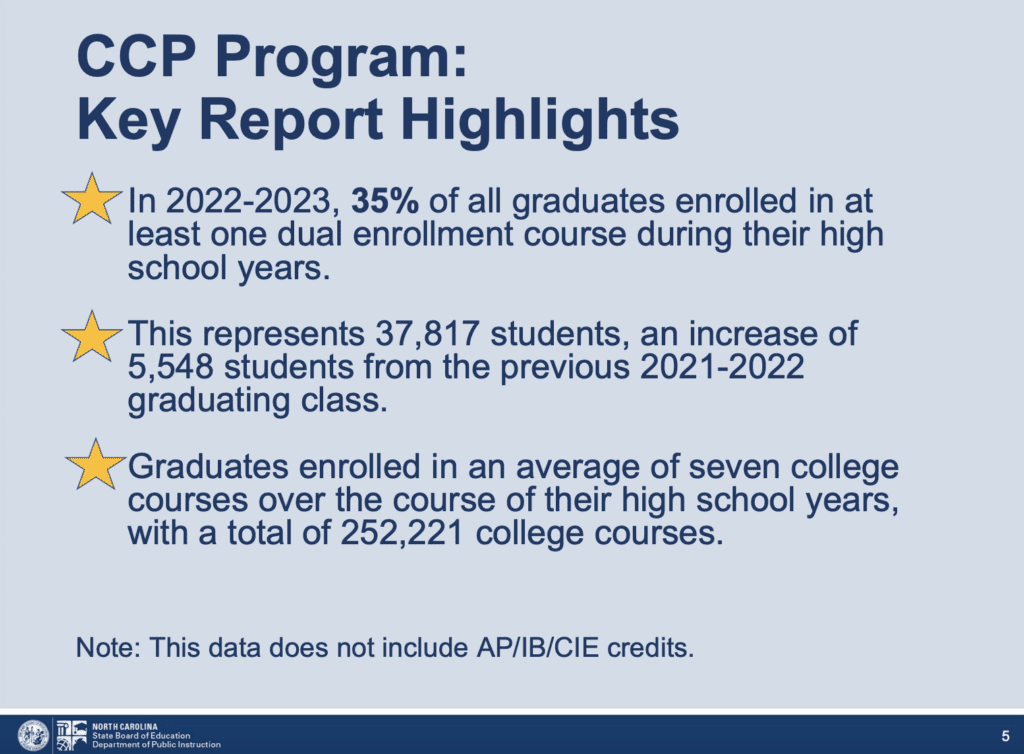
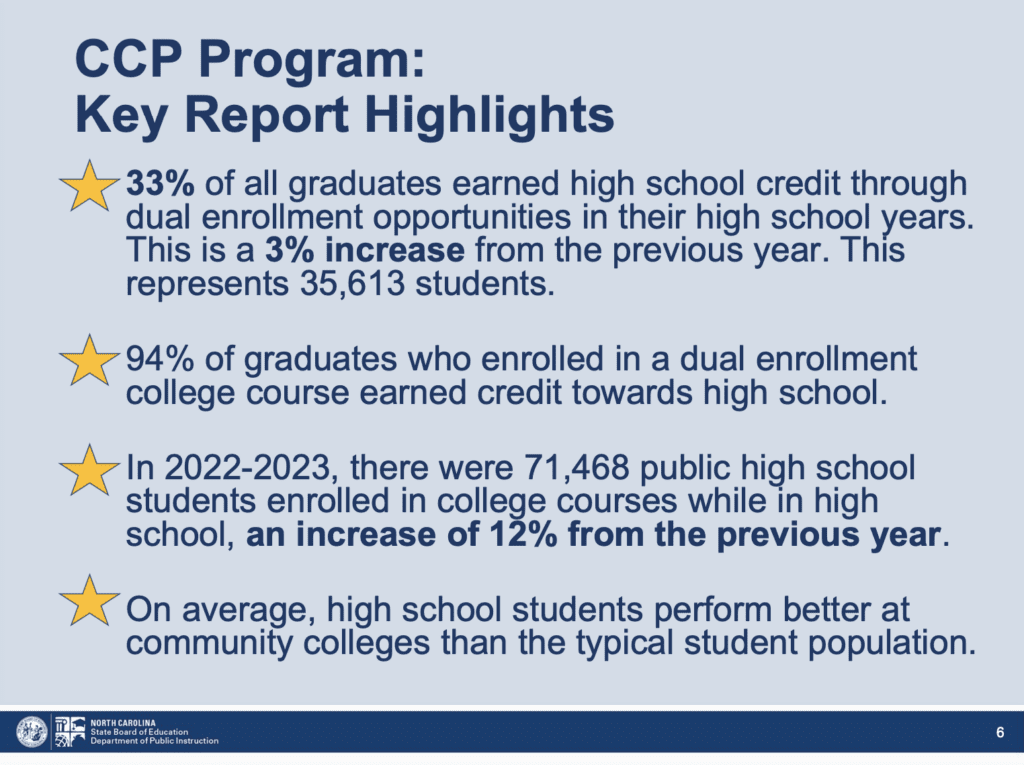
DPI’s presentation also highlighted two students who participated in CCP.
Michael Greene, a 2023 graduate from Anson County Early College, said CCP was really impactful in his life. He works as head mechanic in Lilesville, and is the first in his family to go to college and earn a certificate. He learned about the program from his middle school principal.
“I really love to help students like me that grew up with a hard life,” Greene said. “I recommend this program to anybody.”
La’tonia Mason, a senior in Duplin County Schools taking CCP courses at James Sprunt Community College, said CCP helped her discern what she wants to study in college. CCP Liason Morgan Smith helped Mason set up teacher job shadowing opportunities, and Mason has since decided to pursue teaching after graduation.
She will graduate with her associate degree and a certificate in early childhood education, and will attend North Carolina A&T University.
“CCP also gave me the opportunity to get some type of feel of what college will be like,” Mason said. “I’m glad that I got to get the feel of it before actually going into college next year. I am glad I was part of the CCP program because it also saved money before going to college.”
Shah-Coltrane said DPI is continuing to work with local districts and community colleges to expand the impact of CCP. You can view some of those strategies below.
“The data is clear and the future is bright when it comes to Career and College Promise in our state,” Shah-Coltrane said.

Credential attainment and teacher bonuses
The Board also discussed the 2022-2023 CTE Credentialing Data Report.
CTE high school students earned more than 325,000 credentials during the 2022-23 school year, according to the report. That’s the highest attainment rate in the 13 years the state has collected data, according to a DPI release.
“Aligning the K-12 education system with workforce needs has long been a priority for me. This report is fantastic news for the state of North Carolina because it shows the hard work that CTE educators across the state are doing to bridge the skills gap,” Truitt said. “The process of earning industry-recognized credentials gives students an advantage in a competitive labor market and real-world experience. For potential employers, a credential is a sign that a student has both the knowledge and durable skills they need to succeed in the workplace.”
Truitt also highlighted the need to pay attention to the attainment rate, not just the number of credentials earned.
Across the state, the student attainment rate was 41%, up from 28% in 2021-22.
“Our local superintendents and principals are so committed to doing this, because they know that this is going to — as we have seen several times today — improve the lives of our students,” Truitt said.
You can see the highest credential attainment among districts by number and rates below.
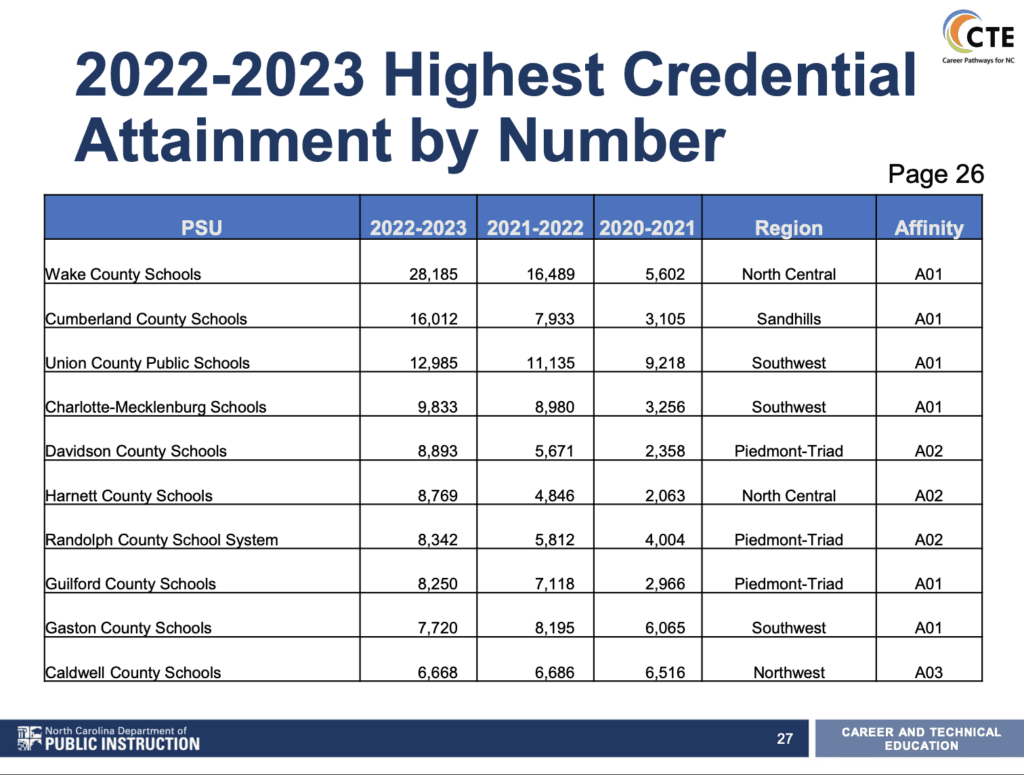
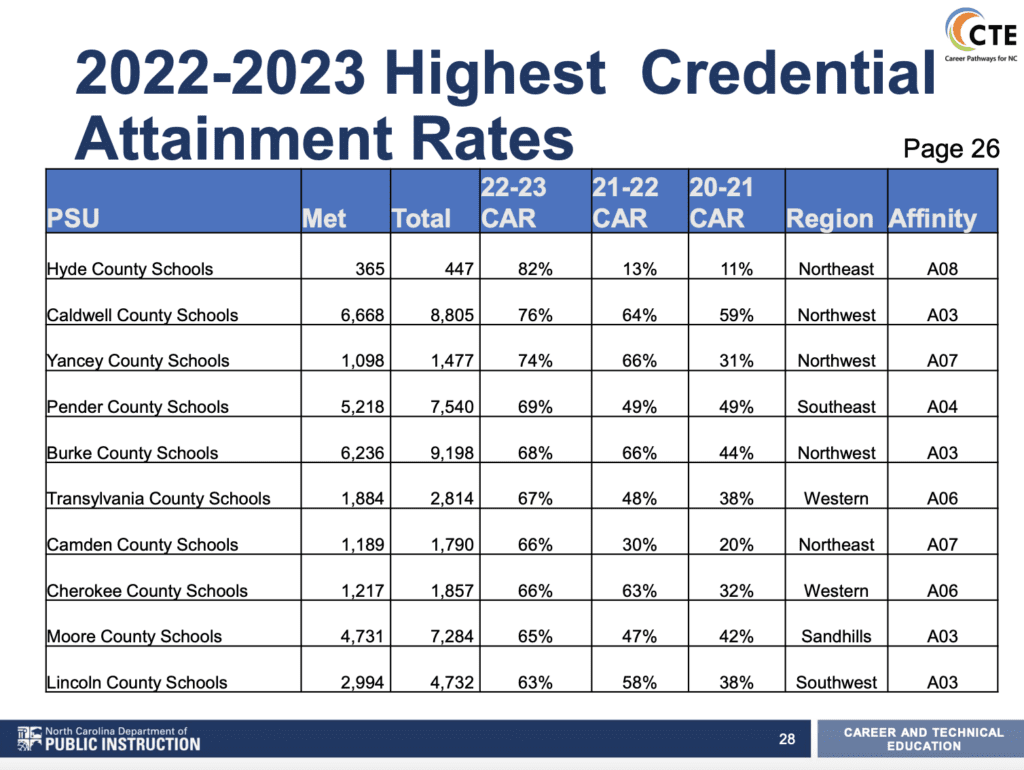
The report also includes several priorities for improvement:
- Incorporating credentialing information with the newly legislated Career Development Plans as a best practice.
- Enhancing the CTE data and information portal, NC CTE Admin, with an electronic, searchable Credential Directory.
- Continuing to improve the process for vetting and approving new credentials, while focusing on an alignment to the NC Workforce credentials of value.
- Supporting PSUs in the implementation of existing credential opportunities.
- Continuing to increase the efficiency and accuracy in the process for collecting and reporting earned credentials.
- Continuing to support PSUs to interpret and utilize credential data. Through an Opportunity Gap Analysis Workshop, PSUs will learn to implement a cycle of
data analysis and improvement planning that involves a cyclical approach of gathering data, identifying gaps, exploring root causes, and developing and implementing action plans to close opportunity gaps. - Developing a NC CTE Data Dashboard to assist PSUs with data analysis to identify gaps and missed opportunities to credential students.
Truitt also said DPI must continue working with myFutureNC to make sure all credentials are being included in statewide attainment data “so that we have a full and accurate picture of how many students are earning any kind of two-year, four- year degree or credential of value by the time they are 24.”
Nutrition funds, ESSER, robotics, and more
- There is currently approximately $4.6 million in ESSER III grants that DPI has identified as available funding for further initiatives, DPI staff told the Board. These extra funds resulted from changes in the budgets for previously approved items, staff said. DPI is requesting those unobligated funds go toward approximately $5.5 million worth of items. The Board will vote on those items in March.
- The Board accepted approximately $32 million from the United States Department of Agriculture (USDA) for supply chain assistance funds. DPI is required to allocate the funds to districts based on student enrollment. These funds must be used for “fresh agricultural products.” This is the fourth round of such funds from the USDA, for a total of approximately $102 million over the last two years.
- The Board welcomed its new local advisor, Dr. Michael Williams, who serves on the Roanoke Rapids Graded School Board of Trustees.
- The state budget allocated $1 million from ESSER III funds to continue the Educational and Competitive After-School Robotics Grant Program during the 2023-2024 school year. DPI received 46 applications totaling $2.1 million in requests. On Thursday, the Board approved 22 of those applications, “potentially reaching as many as 1,900 students,” per DPI materials. According to DPI data, the grants resulted in the creation of 75 new elementary robotics teams in 2022-23 and 2023-24.
- The Board recognized eight school counseling programs that received the North Carolina School Counseling Diamond Award in November 2023: Mills Park Elementary School (Wake County Public Schools), Brooks Magnet Museum Elementary School (Wake County Public Schools), Siler City Elementary School (Chatham County Schools), Neuse River Middle School (Wake County Public Schools), Rolesville Middle School (Wake County Public Schools), Wake Forest Middle School (Wake County Public Schools), Garner Magnet High School ( Wake County Public Schools), and SCORE Academy (Wake County Public Schools).
- The Board voted to wait to vote on the Educator Preparation Program (EPP) approval of two programs: for Moreland University and KIPP North Carolina. In the meantime, the Board will work with DPI to establish more guidance on what contributes to a strong EPP program.
The full Board meets next March 6-7.



